Top 15 AI As A Service Companies For All Types Of Businesses 2026
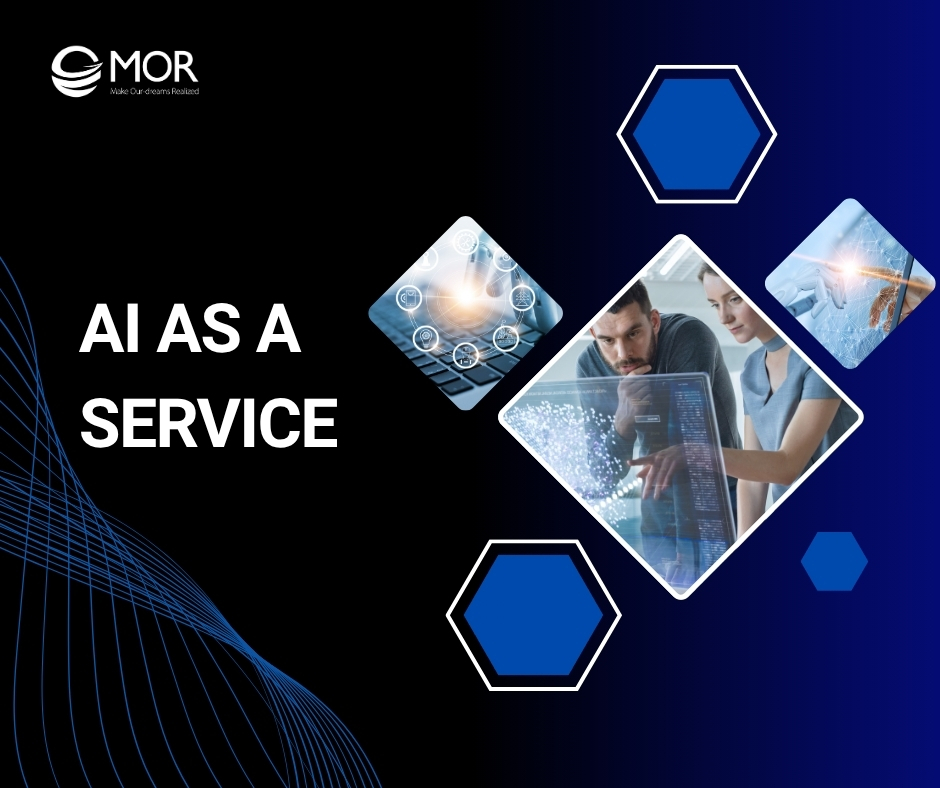
Choosing the right AI as a service solution can be challenging with so many providers and technologies available. In this guide, MOR Software showcases the top AI as a service companies in 2025 to help you find the best fit for your goals and budget.
What Is AI As A Service (AIaaS)?
Artificial intelligence as a service is a cloud-based approach that allows individuals and organizations to access advanced AI capabilities without building systems from scratch.
Under the AI as a service business model, providers deliver ready-to-use tools and platforms through subscription or pay-as-you-go options. This setup makes it possible to experiment with different solutions, test new ideas, and find the most effective fit without heavy up-front investment.
By working with AI as a service companies, businesses can tap into natural language processing (NLP), machine learning (ML) models, predictive analytics, and other intelligent features to automate processes, uncover insights from data, and refine customer engagement strategies.
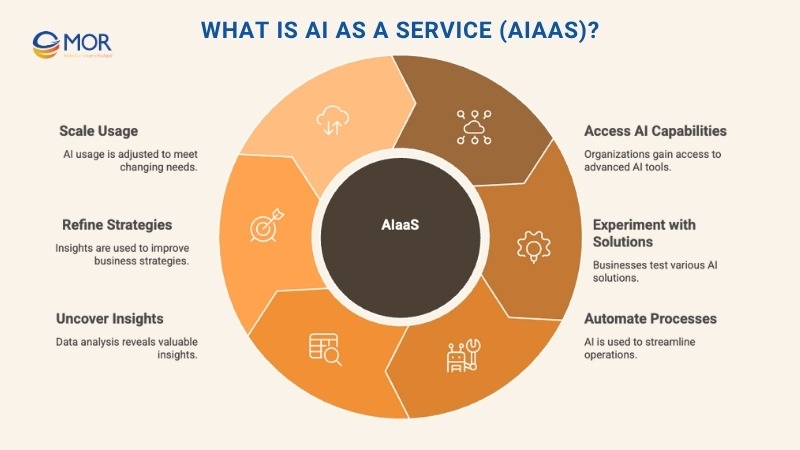
These services remove the need for large in-house teams or extensive budgets, making AI adoption more accessible and less risky.
Because artificial intelligence as a service is delivered through the cloud, it is inherently flexible and scalable. Businesses can quickly adjust their usage as needs change, without investing in additional infrastructure or hardware upgrades. This adaptability is a key reason the AI as a service market continues to expand across industries.
How Does AI As A Service Work?
AI as a Service (AIaaS) delivers artificial intelligence capabilities through cloud-based platforms, allowing organizations to tap into advanced tools without building and hosting them in-house.
Instead of managing complex infrastructure, companies can connect to these services online and access resources for machine learning, natural language processing, computer vision, and more.
Many teams are already moving fast, with McKinsey reporting that by May 2024, 65% of organizations were regularly using generative AI, nearly double the prior survey’s figure ten months earlier.
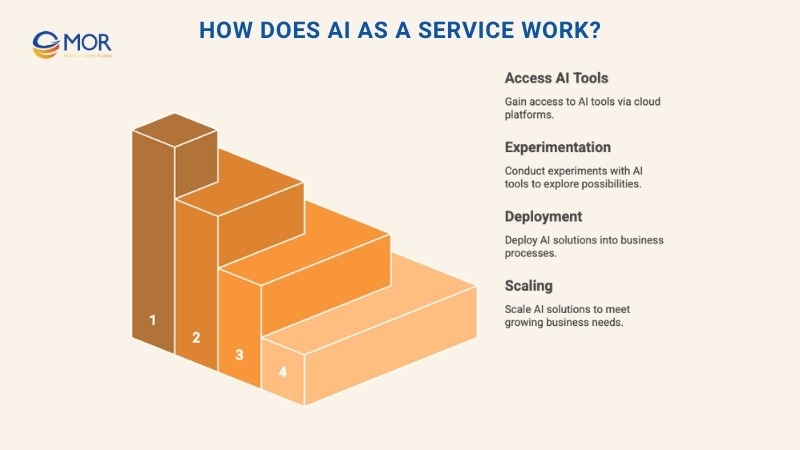
These capabilities are provisioned on demand by AI as a service providers, enabling teams to experiment, test, and deploy AI-driven solutions in different areas of the business.
Because the service runs in the cloud, it offers the scalability and flexibility needed to expand usage as projects grow, all without the ongoing costs and maintenance requirements of internal systems. This approach gives businesses a practical path to adopt AI quickly and integrate it into operations with minimal technical barriers.
IDC projects total enterprise spending on AI solutions to reach about $307 billion in 2025 and to grow to $632 billion by 2028, which reflects how widely these cloud-delivered capabilities are being scaled.
Key Features Of AI As A Service Platforms
AI as a Service platforms give businesses access to advanced AI capabilities without requiring deep in-house technical expertise. They combine scalable infrastructure with ready-to-use tools, making it easier to embed AI into daily operations. Core features include:
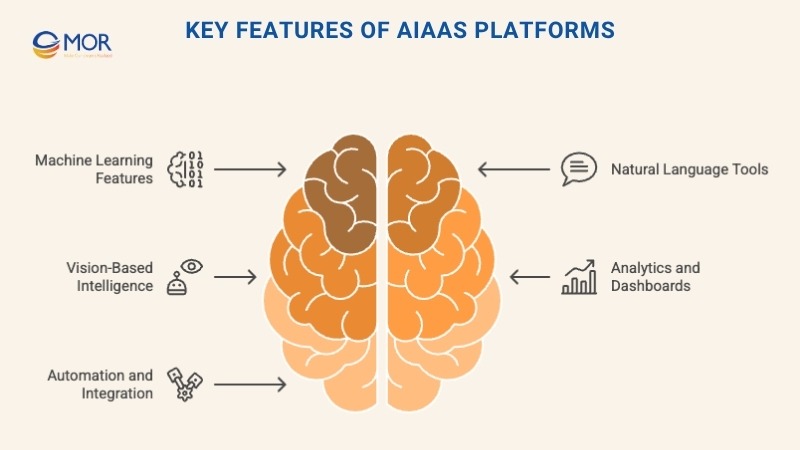
Machine Learning Features
Use pre-trained models or create custom ones to match your business needs. These models support predictions, trend analysis, anomaly detection, and complex pattern recognition, enabling accurate insights from data at scale.
Natural Language Tools
Access AI-powered resources for sentiment analysis, translation, text summarization, and conversational AI. These tools improve customer interactions, power intelligent chatbots, enhance multilingual communication, and reveal customer sentiment trends.
Vision-Based Intelligence
Leverage computer vision capabilities like image and video analysis, object detection, facial recognition, and optical character recognition (OCR). These are valuable for sectors such as retail, healthcare, and security, supporting tasks from stock monitoring to identity checks.
Analytics And Dashboards
Harness AI-driven analytics to process large datasets quickly and extract actionable insights. Visualization dashboards make these insights clear, supporting faster and more informed decision-making.
Automation And Integration
Integrate with current systems and automate repetitive work to streamline processes, save time, and improve operational speed.
By combining these features, AI platform as a service solutions give companies a cost-effective, scalable way to apply AI strategically and achieve specific goals.
Key Benefits Of AI As A Service
AI as a Service (AIaaS) lowers the cost and complexity of adopting artificial intelligence for organizations of any size. Instead of developing and maintaining expensive in-house systems, businesses can access powerful AI capabilities, such as machine learning models or natural language processing, on demand through cloud platforms.
By automating repetitive and routine tasks, AIaaS boosts productivity, reduces errors, and allows teams to focus on strategic, high-value work. These services strengthen business strategies across departments, from marketing and customer service to product development and data analytics.
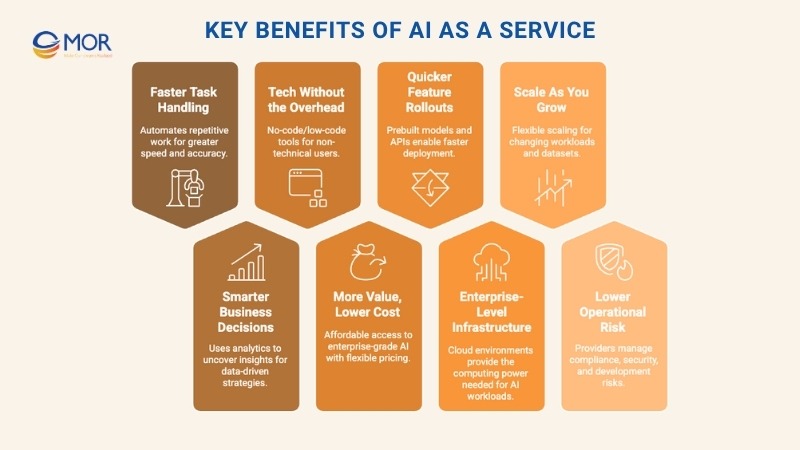
Faster Task Handling
Automates routine operations, helping teams complete work more quickly and with greater accuracy. McKinsey estimates that combining generative AI with other automation could add 0.5 to 3.4 percentage points to annual productivity growth.
Smarter Business Decisions
AI-powered analytics reveal trends and insights that guide data-driven strategies.
Tech Without The Overhead
No-code and low-code AI tools let non-technical staff deploy and manage AI models without deep technical expertise or large development teams. Gartner expects that by 2026, more than 80% of enterprises will have tested or deployed generative AI applications, up from less than 5% in 2023.
More Value, Lower Cost
Gain access to enterprise-grade AI infrastructure without heavy investment. Pay-as-you-go models make scaling more predictable and affordable. AWS reports migrations can deliver 69% lower storage costs and 66% lower networking costs compared with typical on-premises setups.
Quicker Feature Rollouts
Prebuilt machine learning models and APIs allow faster experimentation and integration into existing systems.
Enterprise-Level Infrastructure
Providers supply the compute power and cloud environment required to run AI workloads, removing the need for costly local hardware.
Scale As You Grow
Cloud-based AI adapts to changing workloads and growing datasets without disrupting operations.
Lower Operational Risk
Relying on experienced AI as a service providers reduces development, compliance, and security risks.
With its scalable, accessible, and cost-effective approach, artificial intelligence as a service turns emerging technology into a tangible advantage for modern businesses.
Top 15 AI As A Service Companies Every Business Should Consider
If your business is ready to adopt AI as a service, explore this list of leading AI service providers in the market today. Each offers powerful tools and platforms designed to help organizations integrate artificial intelligence into their operations with speed and scalability.
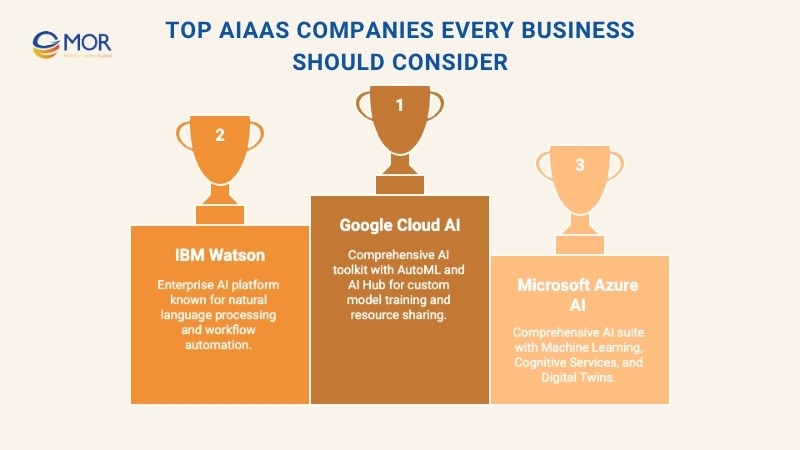
Google Cloud AI
Google Cloud AI is one of the most recognized AI as a service companies, delivering a robust suite of machine learning and AI-powered solutions through the cloud. It includes tools like AutoML, which lets teams train custom machine learning models with minimal coding, and AI Hub, a centralized library for AI resources.
These capabilities make it easier for businesses to improve analytics, build AI-enabled applications, and integrate intelligent features into existing systems.
The platform is especially valuable for organizations without in-house AI developers, giving them access to powerful, ready-to-use models. Medium-sized enterprises, in particular, can adopt Google Cloud AI to enhance operations in ways previously available only to larger corporations.
Beyond that, Google Cloud AI supports sustainability initiatives, offering use cases in intelligent supply chain management and smart factory operations to help ensure ethical sourcing and resource tracking.
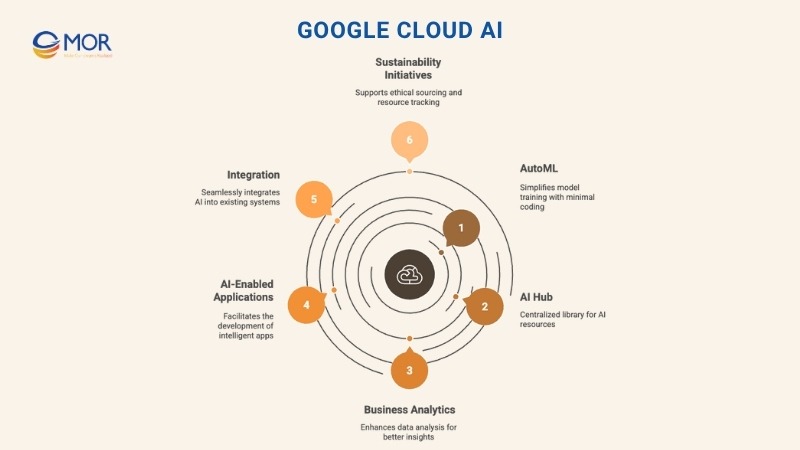
Case Study: P&G
Procter & Gamble (P&G) has leveraged Google Cloud AI to enhance and personalize consumer experiences. The company uses these AI tools to:
- Recommend the most relevant products to consumers at their local stores and reach them through preferred channels.
- Store and analyze large volumes of brand and marketing data for deeper insights.
With BigQuery, P&G built a data lake to unify customer information and create seamless omnichannel journeys. This foundation also enabled the launch of innovative connected products.
Examples include Lumi by Pampers, which monitors babies’ sleep patterns and diaper changes, and the Oral-B iO toothbrush, designed to help users improve brushing habits through AI-driven feedback.
BigML
BigML is a well-established AI as a service provider that focuses on helping users build and deploy machine learning models with ease. Its platform is designed with a clean, intuitive interface, making it accessible even to teams without advanced AI expertise.
This approach allows businesses to adopt machine learning quickly and effectively, without the steep learning curve often associated with AI development.
With BigML, organizations can:
- Develop and integrate machine learning models through a powerful REST API.
- Automate and share workflows using BigML’s domain-specific language tailored for machine learning tasks.
- Work with both supervised and unsupervised learning techniques, including classification, regression, time series forecasting, anomaly detection, and topic modeling.
- Create partial dependence plots to generate and visualize thousands of model predictions in a clear, actionable format.
Its accessibility and versatility make BigML an attractive choice for companies exploring AI as a service examples in real-world projects, especially when technical resources are limited.
IBM Watson
IBM Watson is a long-standing artificial intelligence as a service platform that helps businesses forecast outcomes, automate complex workflows, and improve employee productivity.
First introduced in 2010, Watson gained global attention in 2011 when it competed on the TV quiz show Jeopardy!, showcasing its ability to answer complex, natural language questions.
Today, Watson has evolved into a comprehensive suite of AI tools. This includes pre-trained services like Watson Assistant, which enables the creation of conversational interfaces for any application, device, or communication channel. The platform is designed to simplify daily operations while delivering enterprise-grade AI capabilities.
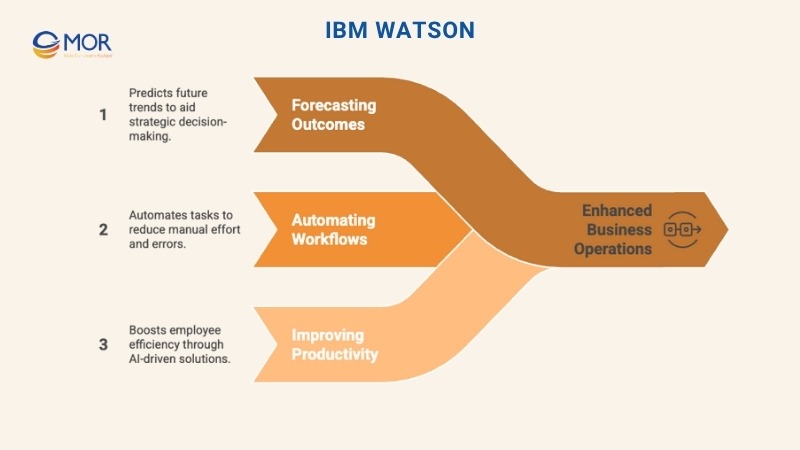
Case Study: LegalMation
LegalMation, a provider of AI-driven solutions for legal professionals, adopted IBM Watson to remove repetitive administrative burdens from lawyers and litigation teams. They leveraged Watson Knowledge Studio and Watson Natural Language Understanding to build a domain-specific AI model tailored to legal terminology and workflows.
The results were remarkable: an estimated 80% reduction in costs and a dramatic decrease in document drafting time, from 6–10 hours to under 2 minutes. This use case highlights how AI cloud services like Watson can transform highly specialized, document-heavy industries.
Alibaba Cloud
Alibaba Cloud is a leading AI as a service provider, delivering both cloud computing and AI capabilities. Established in 2009 by the Alibaba Group, it has grown into a dominant force in the cloud market, particularly across China and the Asia-Pacific region.
Its services rival those of major global players like Azure and AWS, offering businesses a competitive alternative for deploying scalable AI solutions.
The platform includes a wide range of tools such as database management, networking, image recognition, analytics, and security services. These capabilities enable organizations to leverage AI for extracting valuable data insights, making smarter decisions, and improving operational efficiency.
Since becoming the official cloud services partner for the Olympic Games in 2017, Alibaba Cloud has played a key role in helping the event operate more efficiently, securely, and effectively. This global showcase underscores the platform’s ability to deliver high-performance AI cloud services for complex, large-scale operations.
Altair RapidMiner
Altair RapidMiner is a comprehensive AI platform as a service that provides an end-to-end environment for data preparation, machine learning, deep learning, text mining, and predictive analytics. Its client list includes major global brands such as Sony, Canon, Domino’s, Bloomberg, and BMW, reflecting its strong market presence.
Key capabilities of Altair RapidMiner include:
- Model building for predictive and prescriptive analytics.
- Data engineering to prepare and refine large datasets.
- Machine learning operations (MLOps) for deploying and managing models.
- Visual analytics workflows to simplify complex analysis.
- Automated data science to accelerate experimentation and insights.
These tools are widely used for price optimization, fraud detection, churn prevention, large-scale data pattern recognition, and targeted customer segmentation.
Case Study: Fraud Detection
Healthcare providers, insurers, and related organizations face persistent challenges with fraud detection. One healthcare company, as detailed by CIOCoverage, used Altair RapidMiner to collect and process data at scale, flag suspicious activity, and integrate advanced methods for faster fraud identification.
The results were significant: the organization uncovered a $20 million fraud case, prioritized high-risk incidents, reduced investigation time, tracked fraud patterns, and implemented preventative measures.
This example shows how AI data services can deliver measurable value by finding patterns in massive datasets, saving money, time, and resources across the industry.
Clarifai
Clarifai is a specialized AI as a service provider that focuses on computer vision technologies. The platform delivers pre-trained models for image and video recognition while also giving developers the ability to create, manage, and deploy custom machine learning models.
Its tools are designed to handle complex visual data tasks with speed and accuracy, making it a go-to choice for businesses working with large volumes of visual information.
Clarifai is particularly suited for organizations needing AI-powered visual recognition in areas such as:
- Semantic segmentation to identify and label different elements within an image.
- Moving object tracking for monitoring activity in video streams.
- Image classification for sorting and categorizing visual content.
- Visual search to match and retrieve images based on content.
- Large-scale geographical scanning for mapping and analysis.
- Surveillance and reconnaissance in security and defense contexts.
Clarifai combines advanced computer vision capabilities with scalable AI cloud services, enabling industries from retail to security to process and interpret visual data more effectively.
Salesforce Einstein AI
Salesforce Einstein AI blends CRM, AI, and data analytics to help businesses streamline workflows, gain actionable insights, make smarter decisions, and deliver highly personalized customer experiences.
Equipped with capabilities like predictive analytics, natural language processing (NLP), chatbots, and virtual assistants, it serves as a versatile tool for accelerating growth and transforming operations.
Integrated directly into Salesforce products such as Sales Cloud, Marketing Cloud, and Service Cloud, Einstein AI allows organizations to apply its intelligence across sales, marketing, and customer service.
This unified approach improves efficiency, boosts productivity, lowers operational costs, and strengthens customer trust through consistent, data-driven interactions.
Case Study: Gucci
Luxury fashion brand Gucci sought to deliver a personalized customer experience across every touchpoint, including its digital platforms. By adopting Salesforce Einstein AI, the company connected its stores and mobile app through a single, unified platform.
This setup enabled Gucci to send “brand-ready messages” to advisors, ensuring a consistent brand voice and faster client communication.
The solution also provided omnichannel support, allowing customers to interact with advisors via WhatsApp, SMS, or WeChat for quick issue resolution and product information. This example demonstrates how AI as a service examples can elevate both brand consistency and customer engagement on a global scale.
AWS AI
AWS AI from Amazon Web Services delivers an extensive range of AI cloud services that enable businesses to build, train, and deploy machine learning models, as well as integrate AI-driven capabilities into applications.
Among its most notable offerings is Amazon SageMaker, a platform designed for end-to-end model development, training, and deployment. Another flagship service, Amazon Rekognition, adds advanced image and video analysis features to applications without requiring in-depth machine learning expertise.
Amazon Rekognition equips developers with tools such as:
- Face liveness detection to verify real users and prevent fraud.
- Face search and comparison to identify and match individuals across datasets.
- Facial expression and emotion recognition to interpret human sentiment in real time.
- Content moderation to detect and filter unsafe or inappropriate imagery and videos.
- Text detection to extract written information from images.
- Celebrity recognition to identify well-known personalities in media.
AWS AI combines robust infrastructure with prebuilt AI capabilities, giving organizations a practical way to leverage artificial intelligence as a service without deep technical knowledge. This approach accelerates innovation while keeping development costs and complexity low.
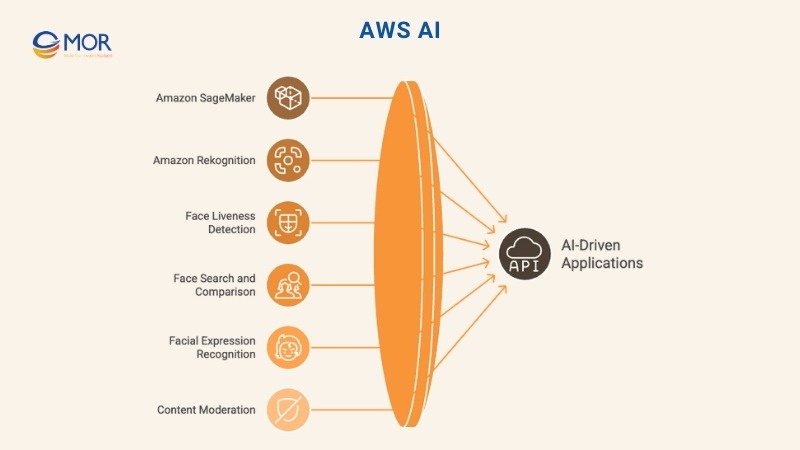
ServiceNow
ServiceNow is a cloud-based AI service platform designed to help organizations automate workflows, improve efficiency, and deliver better experiences for both employees and customers.
Widely adopted across industries, it provides solutions for IT service management, HR service delivery, customer service management, and system integrations through its Integration Hub.
A standout feature of ServiceNow is its virtual agent, which uses intelligent chatbots to handle common inquiries instantly. This capability not only enhances customer support but also boosts employee productivity by resolving issues quickly without manual intervention.
Case Study: Coca-Cola Hellenic Bottling Company (CCHBC)
CCHBC turned to ServiceNow to modernize IT operations and improve the employee experience. Previously, the company relied on a legacy system for managing IT requests, which made tracking, automating processes, and delivering smooth service difficult.
With ServiceNow’s AI-powered tools, CCHBC achieved measurable improvements, including:
- A 20% increase in project efficiency.
- Resolution of critical incidents in an average of 3.5 to 4 hours.
- 150,000 hours returned to employees through automation.
This transformation shows how AI as a service companies like ServiceNow can replace outdated processes with intelligent, automated workflows that save time and improve organizational performance.
Microsoft Azure AI
Microsoft Azure AI is a full-featured AI cloud services suite that includes machine learning platforms, cognitive APIs, and advanced AI development tools. With Azure Machine Learning, organizations can build, train, and deploy machine learning models for a wide variety of business needs.
A defining component of the platform is Azure Cognitive Services, which enables developers to integrate vision, speech, and language understanding directly into applications.
Other standout offerings include Spatial Anchors, used to create immersive 3D mixed-reality applications, and Azure Digital Twins, which allows for building digital replicas of entire physical environments.
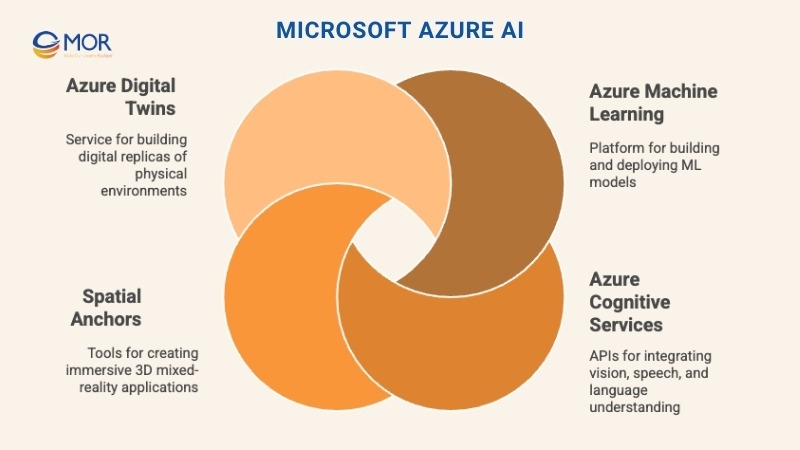
Case Study: TomTom’s Digital Cockpit
TomTom, long known for its GPS technology, leveraged Microsoft Azure AI to create the Digital Cockpit, an advanced in-car infotainment system customizable for automotive manufacturers. This AI-powered solution enables drivers to interact with their vehicles naturally, without relying on a smartphone.
With Azure’s capabilities, TomTom reduced its product team from 10 to just 3 members, while significantly improving performance. Query response times dropped from 12 seconds to 2.5 seconds, demonstrating how AI as a service providers like Azure can deliver both operational efficiency and innovative, user-friendly experiences.
OpenAI
OpenAI is one of the most recognized names among AI as a service companies, best known for its advanced language models, including GPT-3, GPT-3.5, GPT-4, and the newly released GPT-5. These models power a wide range of applications, from content creation and code generation to customer support and image generation.
GPT-5, now available in ChatGPT and through the API, is OpenAI’s most capable model to date, delivering significant improvements in coding, math, writing, health, and multimodal understanding.
For developers, it comes in three API sizes, gpt-5, gpt-5 mini, and gpt-5 nano, allowing teams to balance performance, cost, and latency, with pricing starting at $1.25 per million input tokens and $10 per million output tokens.
It is optimized for advanced coding and agentic workflows, supporting long tool-call chains, front-end UI generation with minimal prompting, and new controls like a verbosity parameter and minimal reasoning mode.
Through its API, OpenAI enables developers to build applications capable of drafting emails, writing code, producing articles, answering complex questions, and generating images from text prompts. This flexibility makes it a strong choice for businesses looking to integrate natural language processing and generative AI into their products or workflows.
Several companies have adopted OpenAI models to power innovative solutions:
- Stripe uses GPT-4 to improve user experience and strengthen fraud detection.
- Jasper AI combines GPT-4 with other models from Anthropic and Google to generate high-quality text that aligns with brand voice and incorporates up-to-date search data.
- Duolingo integrates GPT-4 into its language learning platform for interactive conversation practice and personalized feedback.
- Microsoft is rolling out GPT-5 across its products, extending advanced AI capabilities to a broad range of consumer and enterprise applications.
By offering powerful artificial intelligence as a service, OpenAI gives businesses access to cutting-edge AI capabilities without the need for extensive in-house model development.
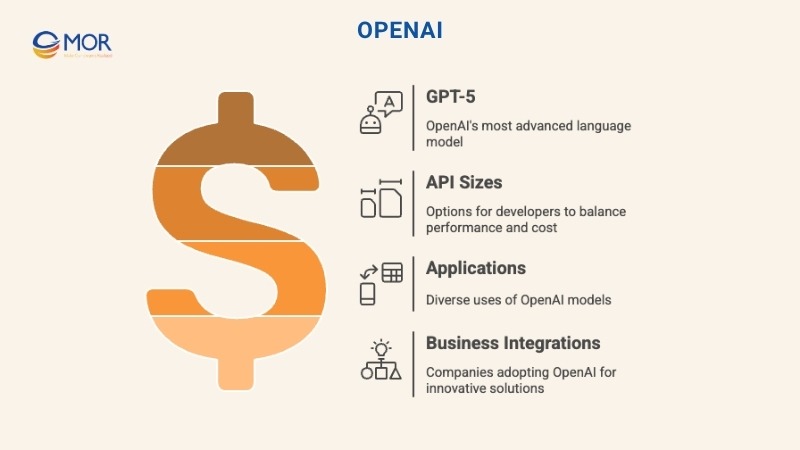
H2O.ai
H2O.ai is an enterprise-focused AI platform as a service specializing in automated machine learning (AutoML).
Its flagship product, Driverless AI, enables data scientists and analysts to accelerate projects by automating key stages such as data visualization, feature engineering, model creation and validation, documentation, and machine learning interpretability.
Driverless AI is designed for high-performance computing, operating on both CPUs and GPUs. It can analyze thousands of model variations and combinations, identifying the best-performing option in just minutes or hours. This speed allows teams to move from data to actionable models far more efficiently.
Another standout tool is AI Wizard, which evaluates a company’s data and business needs to recommend the most suitable machine learning techniques. By guiding users toward optimal approaches for their unique datasets and use cases, H2O.ai delivers powerful AI data services that streamline and enhance the model development process.
DataRobot
DataRobot is a leading AI as a service provider that simplifies the creation, deployment, and management of artificial intelligence and machine learning models at scale. Its core strength lies in automated machine learning (AutoML), enabling organizations to accelerate AI adoption without the need for extensive manual model development.
For example, a financial services company aiming to improve credit risk assessment can input historical loan data into the platform.
DataRobot then automates the training of hundreds of models, testing and refining them to identify the one with the highest predictive accuracy. This drastically reduces the time and resources required compared to traditional, manual approaches.
Case Study: FordDirect
FordDirect, a joint venture between Ford Motor Company and its Ford and Lincoln dealerships, sought to deliver a more personalized customer journey. By interpreting thousands of customer signals, the company aimed to time its marketing and sales interactions for maximum relevance.
DataRobot’s AI platform enhanced FordDirect’s Customer Journey Platform by providing advanced recommendations, optimizations, and actionable insights.
The shift reduced technology debt by $3 million and cut the time from data access to execution by 75%. This illustrates how AI as a service business model solutions like DataRobot can transform both operational efficiency and customer engagement.
Oracle Cloud Infrastructure (OCI)
Oracle Cloud Infrastructure (OCI) is a comprehensive AI cloud services platform designed to deliver secure, high-performance, and cost-effective solutions for businesses of all sizes. It provides the foundation for building, deploying, and managing AI-powered applications while maintaining enterprise-grade reliability.
OCI’s offerings span compute, storage, networking, analytics, databases, and security, enabling organizations to run diverse workloads with speed and stability. A key advantage is its seamless compatibility with Oracle’s on-premises software, which simplifies the process of migrating existing IT infrastructure to the cloud.
Oracle Cloud Infrastructure combines strong performance with easy integration, supporting companies in scaling their AI initiatives while reducing operational complexity and costs.
This makes it a competitive choice among AI as a service providers for organizations aiming to modernize their tech stack without disrupting ongoing operations.
MonkeyLearn
MonkeyLearn is a cloud-based AI platform as a service specializing in text analysis, enabling businesses to extract actionable insights from unstructured data sources such as customer reviews, social media posts, emails, and surveys.
The platform offers a library of pre-trained machine learning models for tasks like sentiment analysis, topic classification, and entity extraction. Businesses can also create custom models tailored to their specific datasets and use cases, ensuring more accurate and relevant results.
With its intuitive interface and high level of customization, MonkeyLearn helps organizations analyze large volumes of text quickly, make data-driven decisions, enhance customer experiences, and uncover new business opportunities.
This flexibility and accessibility position it as a valuable player in the AI as a service market for companies aiming to transform raw text data into strategic insights.
Types of AI as a Service (AIaaS)
AI as a service companies provide a range of tools and solutions, so identifying your business goals is essential before selecting a platform. Below are the most common types of AI service offerings available today.
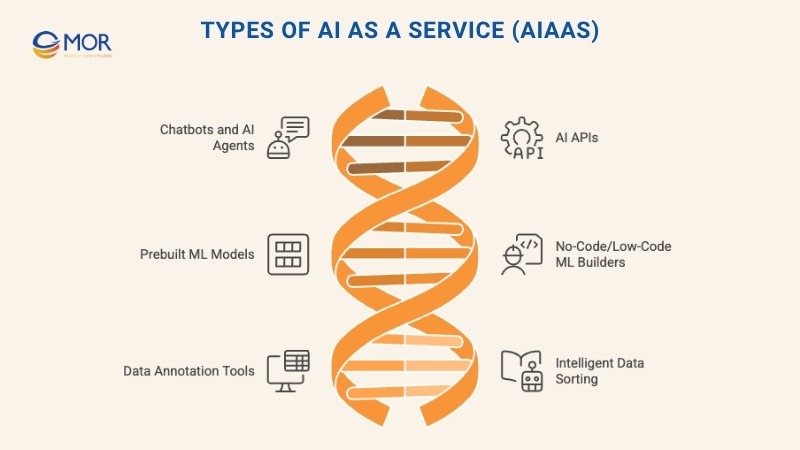
Chatbots and AI Agents
Chatbots are among the most recognizable AI tools, designed to engage in natural conversations with users. They help businesses deliver customer support, answer FAQs, and guide users through processes.
- When to use it: Ideal for providing 24/7 customer assistance, automating routine inquiries, and improving response times.
- How it works: Powered by NLP algorithms, these agents understand and respond in human language.
- What to expect: Customers get quick answers anytime, while human teams focus on complex cases.
AI APIs
An application programming interface (API) acts as a bridge between different applications, enabling them to share data and functionality. Many AI as a service providers use APIs for tasks like text translation, sentiment analysis, and computer vision.
- When to use it: When connecting multiple apps or integrating AI tools for specific functions.
- How it works: APIs pull and process data from various sources for richer analysis.
- What to expect: Smooth communication between tools that might otherwise operate in isolation.
Prebuilt Machine Learning Models
Machine learning models analyze data and predict outcomes, and many AI platform as a service providers offer them pre-trained. Businesses can deploy these models without heavy technical expertise.
- When to use it: To identify trends, improve processes, or forecast results.
- How it works: The model detects patterns, makes predictions, and learns from new data.
- What to expect: Quick deployment with minimal coding, though careful monitoring is still necessary.
No-Code and Low-Code ML Builders
Some AI cloud services include visual, drag-and-drop interfaces that allow non-technical users to build ML models without coding.
- When to use it: When development resources are limited or you need fast AI adoption.
- How it works: Pre-built algorithms handle training and deployment from start to finish.
- What to expect: Faster AI adoption with minimal hands-on setup.
Data Annotation Tools
Also called data labeling, this process prepares raw text, image, or video data for machine learning by tagging and organizing it.
- When to use it: During the training phase of ML or AI models.
- How it works: Labels add meaning so models can interpret and learn from the data.
- What to expect: Once trained, the model can recognize similar patterns in future datasets.
Intelligent Data Sorting
Data classification organizes information by tagging it according to its type, structure, and purpose, making it easier to use.
- When to use it: To sort and categorize large sets of structured or unstructured data.
- How it works: AI uses predefined rules to automatically classify and store data.
- What to expect: Better organization and faster retrieval of business information.
Common Applications of AI As A Service
Artificial intelligence as a service is reshaping industries by improving efficiency, sparking innovation, and delivering measurable value. Below are some of the most common use cases and the real-world benefits they bring.
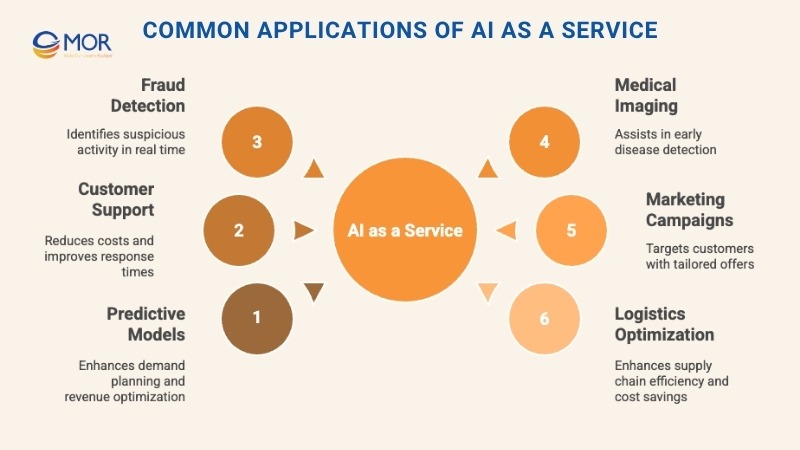
Forecasting With Predictive Models
AI as a service companies use predictive analytics to improve demand forecasting and sales planning. By studying past performance and current market signals, businesses can anticipate customer needs, fine-tune inventory, schedule promotions, and make informed choices that increase revenue.
Smarter Customer Support
AI-powered chatbots and virtual assistants automate routine customer interactions, providing instant responses and personalized suggestions. This reduces operational costs, shortens wait times, and frees support teams to handle more complex issues.
Spotting Fraud in Real Time
Many AI as a service providers deploy anomaly detection models in sectors like banking, ecommerce, and insurance. These systems identify unusual transactions as they happen, helping protect both businesses and customers from fraud.
AI in Medical Imaging and Diagnosis
AI cloud services in healthcare use machine learning to interpret medical scans such as X-rays and MRIs. This technology assists doctors in detecting diseases, from cancer to heart conditions, earlier and with greater accuracy.
Personalized Campaigns in Marketing
By analyzing user behavior, preferences, and demographics, AI data services help marketers design campaigns that resonate with individual customers. This targeted approach drives stronger engagement and higher conversion rates.
Smarter Logistics and Supply Chains
AI platform as a service tools optimize supply chain performance by evaluating routes, identifying process bottlenecks, and recommending operational improvements. Manufacturers and retailers, in particular, benefit from faster deliveries and lower costs.
Through these ready-to-use solutions, AIaaS enables organizations of any size to access advanced AI capabilities without needing deep in-house expertise or heavy infrastructure investment.
Common Pitfalls of Implementing AI As A Service
While AI as a service has reshaped how companies work, it’s not without its challenges. Businesses often encounter obstacles that can delay adoption, increase costs, or reduce the quality of outcomes.
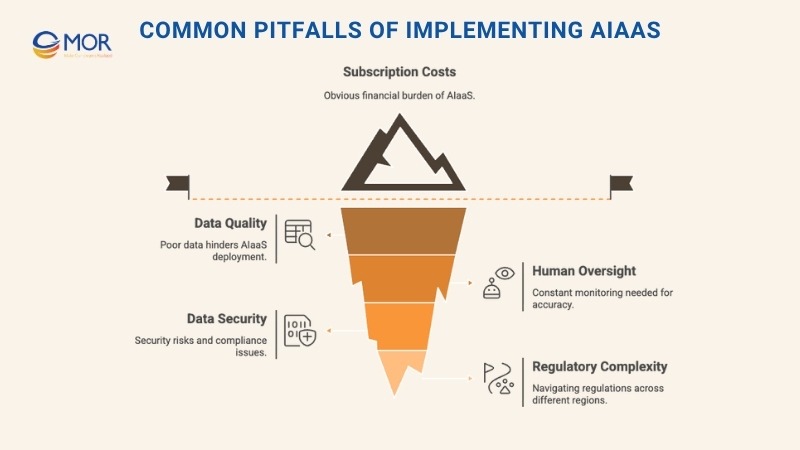
- Rising costs and vendor lock-in: Subscription fees can escalate over time, and relying too heavily on a single provider may make it difficult to switch platforms without disruption.
- Poor data quality: AI models can only deliver accurate results if they’re trained on clean, well-labeled data. Many organizations underestimate the time and budget required for data preparation, which can stretch into months before deployment.
- Ongoing need for human oversight: Even with automation, AI outputs still require review to avoid errors, bias, or misinterpretation.
- Data security and privacy risks: Moving sensitive business or customer information to third-party platforms can expose organizations to breaches and compliance issues.
- Regulatory challenges: Meeting legal requirements like GDPR or CCPA becomes more complex when data crosses borders, increasing the risk of non-compliance.
MOR Software Helps Businesses Overcome AI As A Service Challenges
At MOR Software, we build AI-driven solutions that actually work in the real world. We don’t just hand off a generic tool. We align every AI service with your business needs, tech stack, and data maturity.
We’ve seen where AIaaS projects fail: rushed implementation, messy data, lack of ownership. That’s why we support you from end to end, helping you avoid costly mistakes and extract real value.
- Data preparation support: Our engineers help you clean, label, and structure your data properly, before it hits the model.
- Compliance-first development: We build AI solutions with security and privacy baked in, aligned with regulations like GDPR and CCPA.
- Custom + scalable infrastructure: No vendor lock-in. We design AI architectures that are flexible, portable, and future-proof.
- Ongoing consulting and maintenance: We stay involved after launch. You get continuous updates, retraining, and optimization.
Whether you're just testing AI or scaling up across departments, MOR Software makes sure your AI as a service investment pays off.
Conclusion
AI as a service gives businesses access to advanced tools and scalable infrastructure without costly in-house development. The right AIaaS provider can streamline operations, improve decision-making, and keep you competitive. With MOR Software, you can select top AI as a service companies that match your goals and budget. Contact MOR Software today to build, customize, and scale AI solutions that deliver real business results.
MOR SOFTWARE
Frequently Asked Questions (FAQs)
What is the AI as a service?
AI as a Service (AIaaS) allows businesses to access artificial intelligence tools through cloud platforms without needing to build or maintain their own infrastructure. Companies can use features like machine learning and natural language processing on a subscription or pay-as-you-go basis, making AI more scalable and budget-friendly.
Is ChatGPT AIaaS?
Yes, ChatGPT is part of OpenAI's broader AIaaS offerings. While many know it as a chatbot, it also represents a larger suite of cloud-based AI models like GPT-4, which developers can use for tasks such as text generation, summarization, and language understanding.
What are the 4 types of AI?
The four main categories of AI are: reactive machines, limited memory systems, theory of mind, and self-aware AI. Each type reflects a different level of capability, from basic task performance to advanced reasoning and consciousness.
What is service AI?
Service AI refers to artificial intelligence solutions designed for specific service-oriented tasks. One example is its application in accessibility tools, where AI helps interpret visual content for users who are blind or have low vision, enabling real-time support within widely used platforms.
What is gen AI as a service?
Generative AI as a service delivers powerful language models via the cloud, allowing organizations to integrate them into applications for writing, summarization, data analysis, and conversational interfaces. Oracle’s offering is one example of a managed service designed to simplify this integration process.
Who offers AI as a service?
Several major tech companies provide AIaaS solutions. Leading names include IBM Watson, Amazon Web Services (AWS), and Palantir. These platforms supply tools that support data security, predictive analytics, and intelligent automation for businesses across industries.
What is model as a service?
Model as a Service (MaaS) refers to the delivery of machine learning models through cloud-based APIs. Instead of building models from the ground up, businesses can use pre-trained models hosted online to perform tasks like predictions, classifications, or data processing with minimal setup.
Rate this article
0
over 5.0 based on 0 reviews
Your rating on this news:
Name
*Email
*Write your comment
*Send your comment
1